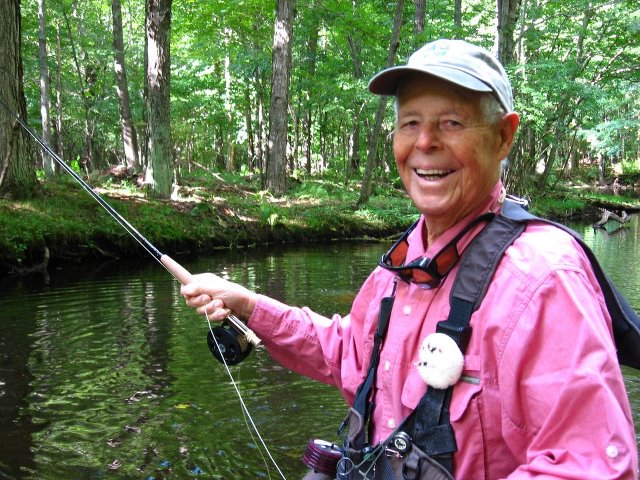April 11, 2012
By John Randolph

Gardner L. Grant of Purchase, NY, and Jupiter, FL, a longtime member of the American Museum of Fly Fishing, The Federation of Fly Fishers, the Atlantic Salmon Federation, Theodore Gordon Fly Fishers,  and others, passed away on March 28, 2012, after a long battle with cancer. He was 85 years old. Born in Boston, MA, Grant spent his early years in Providence Rhode Island. He was a graduate of Yale College and Harvard Business School, and led a family-owned company in the invention and development of equipment for the automatic collection of tolls on tunnels, bridges, and turnpikes. Following the sale of the company to a publicly held corporation, he moved his family to Scarsdale, New York and continued to serve as president for over a decade. Later, Gardner became active in real estate development and management. A life-long, passionate fly fisherman, Grant was active in numerous environmental and angling related organizations. He served as president of New York's Theodore Gordon Fly Fishers, the Federation of Fly Fishers and the American Museum of Fly Fishing; and a board member of Trout Unlimited, the Atlantic Salmon Federation, the Hudson River Foundation for Science and Environmental Research and Yale's Peabody Museum of Natural History.
Grant is survived by his wife, Ellen, of over 60 years; his daughter, Laurie Zimmerman; son Gardner L. Grant, Jr; son-in-law, Dr. Franklin Zimmerman; daughter-in-law, Sulu Hegde Grant; and grandchildren: Stacey, Ricky, Sean and Shakira. The family requests that any donations in Gardner's memory be made to the American Museum of Fly Fishing in Manchester, Vermont.
My Remembrances of Gardner Grant
He was a lifelong friend of Ernie Schwiebert, with whom he fished for Atlantic salmon in Iceland, trout in the Catskills, where for many years he owned a home on the upper Beaverkill, and other trout rivers of the world. He introduced Ernie to the love of great wines, and in just a few years Ernie, with his encyclopedic memory, became an enthusiastic and knowledgeable aficionado. Gardner admired Ernie for his understanding of aquatic entomology, his broad knowledge of, and experiences on, the world's greatest trout and salmon rivers and his extraordinary fly-tying, writing and fishing skills. He was, in effect, the leader of what we used to call "Ernie's Army," of enthusiastic followers and admirers.
Advertisement
But Gardner was much more. He was a superb fly fisher, with expert casting skills and a hatch-matcher's eye for riseforms and the right flies to match them. As with many great fly fishers of our sport's Golden Age (from Jennings to Flick, the Wulffs, Marinaro, Caucci/Nastasi, Kreh, and the rest), fly fishing was a graceful and rewarding way of life to share with friends. More importantly, he used his great business skills to help fly-fishing conservation groups around the U.S. grow from men's clubs to national environmental organizations with broad reach and significant political influence. His active, but quiet, roll in making good things happen changed fly fishing. As an example: When Gardner began fishing in Iceland, he discovered that those greatest salmon rivers in the world (in the 1970's) were grossly underpriced for fee fishing (around $30/beat/half day). Schwiebert was fond to tell how Gardner got the farmers, who rented beats on their rivers, together and convinced them to raise their rates comparable to the other great salmon rivers, to provide funds for salmon conservation work and a higher standard of living for themselves. It worked. He also convinced them, reluctantly and over time, to practice catch-and-release, to protect Iceland's third most precious asset (after cod and tourism). American anglers who now fish for Icelandic salmon release their catch, although most Icelanders still keep them, for sale or consumption. Today Iceland's salmon rivers are the most (and best) scientifically managed in the world, in large part due to the significant revenue they bring to the island from wealthy fly fishers who fish them. (Note: Most Icelanders fish for salmon with worms, despite the fact that worms are not native to volcanic Iceland.)
As Joan Wulff told me recently: "Gardner Grant was the single most important person who contributed unpaid work to make important things happen for our sport of fly fishing. Among many other things, he sponsored the film "Why Fly Fish" by Miracle Productions for the American Museum of Fly Fishing in 2007-2008. He is the Anglers Club honoree for this year's CFF&M' Flyfisher's of Distinction event to be held at the Angler's Club on April 24th.
Gardner Grant was a mover and shaker as president of the Federation of Fly Fishers, in 1979 convincing President Jimmy Carter to visit the opening of its headquarters in West Yellowstone, Montana and helped him continue his newly discovered passion for our sport. Gardner brought a new focus to the FFF, a national organization with expertise in science-based education on conservation issues that affect fly fishing. He worked to broaden the FFF's 12,000-member base, hoping to help it match the growth of Trout Unlimited (then about 60,000 and now over 150,000). Unfortunately, the FFF membership remains below 15,000 today.
Advertisement
His leadership was influential from the beginning in the growth of the American Museum of Fly Fishing in Manchester, Vermont, helping to facilitate its steady growth from 1978 to the present, and he helped Joan and Lee Wulff in founding and growing the Catskill Fly Fishing Center and Museum in Roscoe, New York. He was a lifelong member, national board member and important contributor to Trout Unlimited and helped that organization become the most influential fishing-related conservation group in the world.
Gardner Grant's life was well lived. He changed the world through which he moved, lived, traveled, worked, and fished. And he was a joy to fish with, a man well met with a great love of life and fly fishing.

